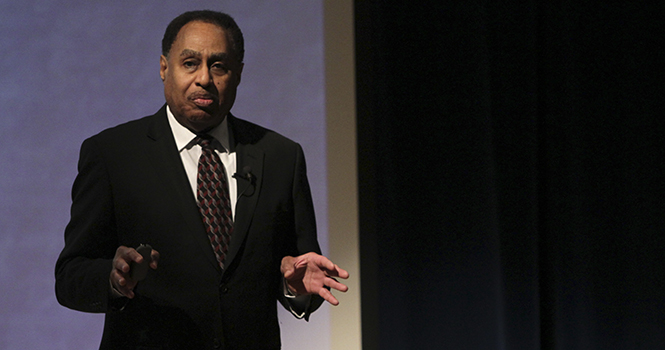A travel back in time: Keynote speaker discusses inspiration
Dr. Ron Mallett explains his theories on the possibility of time travel during Kent State University’s College of Nursing “Driving the Future” on March 4, 2013. Photo by MELANIE NESTERUK.
March 5, 2013
Kent State Unviersity’s College of Nursing hosted its 7th annual Driving the Future event Monday.
The theme of the daylong event this year was Inspiration to Innovation. The keynote speaker was Dr. Ron Mallett, a scientist, innovator and professor from University of Connecticut. Dr. Melody Tankersley, Kent State University provost fellow, Dr. Vincent Hetherington, senior associate dean of the Kent State University College of Podiatry, Dr. John West, university trustees research professor with the Kent State University Liquid Crystal Institute, and Maria Jukic, JD, executive director of the Cleveland Clinic Arts & Medicine Institute, spoke on the panel of experts following Mallett’s presentation. The experts focused on topics including healthcare, medicine, education and the arts.
Laura Dzurec, dean of the College of Nursing, coined the term “Driving the Future”.
“Driving the Future is a series of events focused on a presentation of topics that will help graduates and faculty to bridge the gap between education and practice in our changing healthcare environment,” Dzurec said. “This year, it entails innovation, because so much is changing so fast.”
Mallett is best known for his work in the idea of time travel. When he was ten years old, Mallett was devastated by the sudden death of his father. He became obsessed with the idea of time travel in hopes that he could go back in time to help his father. With inspiration from H.G. Wells’s book “The Time Machine” and Albert Einstein’s theory of time, Mallett discovered a theory of time travel that cannot be disproved.
Michelle Bozeman, outreach program manager for the College of Nursing, helped coordinate the event.
“What I see in him is that he took this experience in his life that was really close to his heart, and was inspired by it,” Bozeman said. “He has studied and done all of the things that are needed to do to build skills, wisdom and understanding so that he can innovate around it. Who knows what his work is going to produce.“
Dzurec said Mallet’s perseverance and dedication to an idea he believes in led them to ask him to be the keynote speaker.
Mallett used an analogy to describe innovation and inspiration.
“Einstein said that imagination is more important than knowledge,” Mallett said. “What he meant by that is if you want to drive somewhere, you have to have a vehicle, and it needs an engine and fuel. Knowledge is the engine, but fuel is inspiration. You have to have imagination in order to fuel the knowledge, in order to get somewhere. For me, the thing that fueled me was a tragedy that happened.”
Mallett said he had two goals in his presentation.
“One is that time travel really is possible. It has a scientific base to it,” Mallett said. “Another thing is the fact that people should follow their dreams. If people have a passion, something that they really feel strongly about, they should follow it.”
Contact Amanda Knauer at [email protected].












